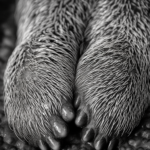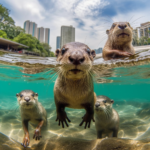The River Otter, scientifically known as Lontra canadensis, is a fascinating and charismatic mammal that can be found in various regions of North America, including Rhode Island. These semi-aquatic creatures are well-adapted to their aquatic lifestyle, with webbed feet, a streamlined body, and a thick, waterproof coat. River otters are known for their playful nature and excellent swimming abilities, making them a delight to observe in their natural habitat. In this article, we will delve into the world of River Otters in Rhode Island, exploring their habitat, behavior, and conservation efforts to protect these remarkable animals. So, let’s dive in and discover more about the enchanting River Otters of Rhode Island.
Key Takeaways
- The river otter is a native species to Rhode Island and can be found in various water bodies across the state.
- River otters are excellent swimmers and have adapted to both freshwater and saltwater environments.
- They play a crucial role in maintaining the health of aquatic ecosystems by controlling populations of fish and invertebrates.
- River otters are highly social animals and can be observed in family groups.
- Conservation efforts are important to protect and preserve the river otter population in Rhode Island.
The Geography of Rhode Island: A River Perspective
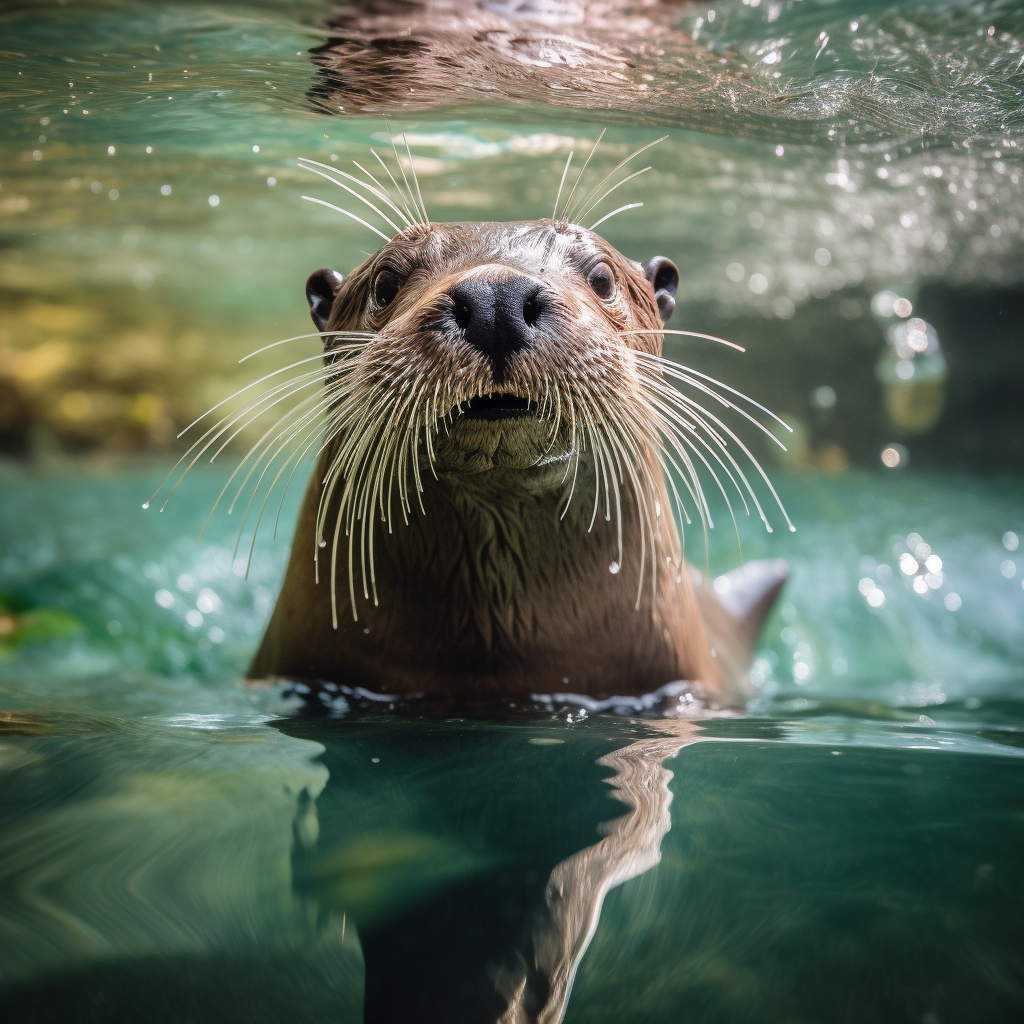
A. The Number of Rivers in Rhode Island
Rhode Island may be the smallest state in the United States, but it is home to a surprising number of rivers. Despite its compact size, the state boasts over 120 rivers and streams that crisscross its picturesque landscape. These waterways play a vital role in shaping the geography and ecosystem of Rhode Island.
The rivers in Rhode Island vary in size and length, ranging from small streams to larger water bodies like the Blackstone River and the Pawcatuck River. These rivers flow through diverse terrains, including forests, wetlands, and urban areas, providing a unique habitat for various wildlife species.
B. The Role of Rivers in Rhode Island’s Ecosystem
Rivers are not just scenic features of the Rhode Island landscape; they also play a crucial role in the state’s ecosystem. These waterways support a rich diversity of plant and animal life, contributing to the overall biodiversity of the region.
River ecosystems provide essential habitats for a wide range of species, including the North American River Otter. These aquatic mammals rely on the rivers of Rhode Island for their survival. The otters are well-adapted to the river environment, with their streamlined bodies, webbed feet, and dense fur that keeps them warm in the water.
The rivers of Rhode Island offer an abundant food source for the otters. They have a varied diet, consisting of fish, amphibians, crustaceans, and even small mammals. The otters are skilled hunters, using their sharp teeth and agile swimming abilities to catch their prey.
In addition to supporting wildlife, rivers also contribute to the overall health of the ecosystem. They help regulate water flow, prevent flooding, and filter pollutants, ensuring clean water for both humans and animals. The vegetation along the riverbanks helps stabilize the soil, preventing erosion and providing a buffer zone for the surrounding land.
Rhode Island recognizes the importance of its rivers and has taken steps to protect and conserve these valuable resources. The state has established numerous parks and protected areas along the riverbanks, providing recreational opportunities for residents and visitors while preserving the natural habitats.
Efforts are also underway to monitor and track the otter population in Rhode Island. Researchers and conservationists work together to study the behavior and movements of these fascinating creatures. By understanding their habits and habitat requirements, conservation efforts can be tailored to ensure the long-term survival of the otter species in Rhode Island.
In conclusion, the rivers of Rhode Island are not only scenic and beautiful but also essential components of the state’s ecosystem. They support a diverse array of wildlife, including the North American River Otter, and contribute to the overall health and biodiversity of the region. It is crucial to continue protecting and conserving these rivers to maintain the delicate balance of Rhode Island’s natural environment.
The River Otter: A Native of Rhode Island
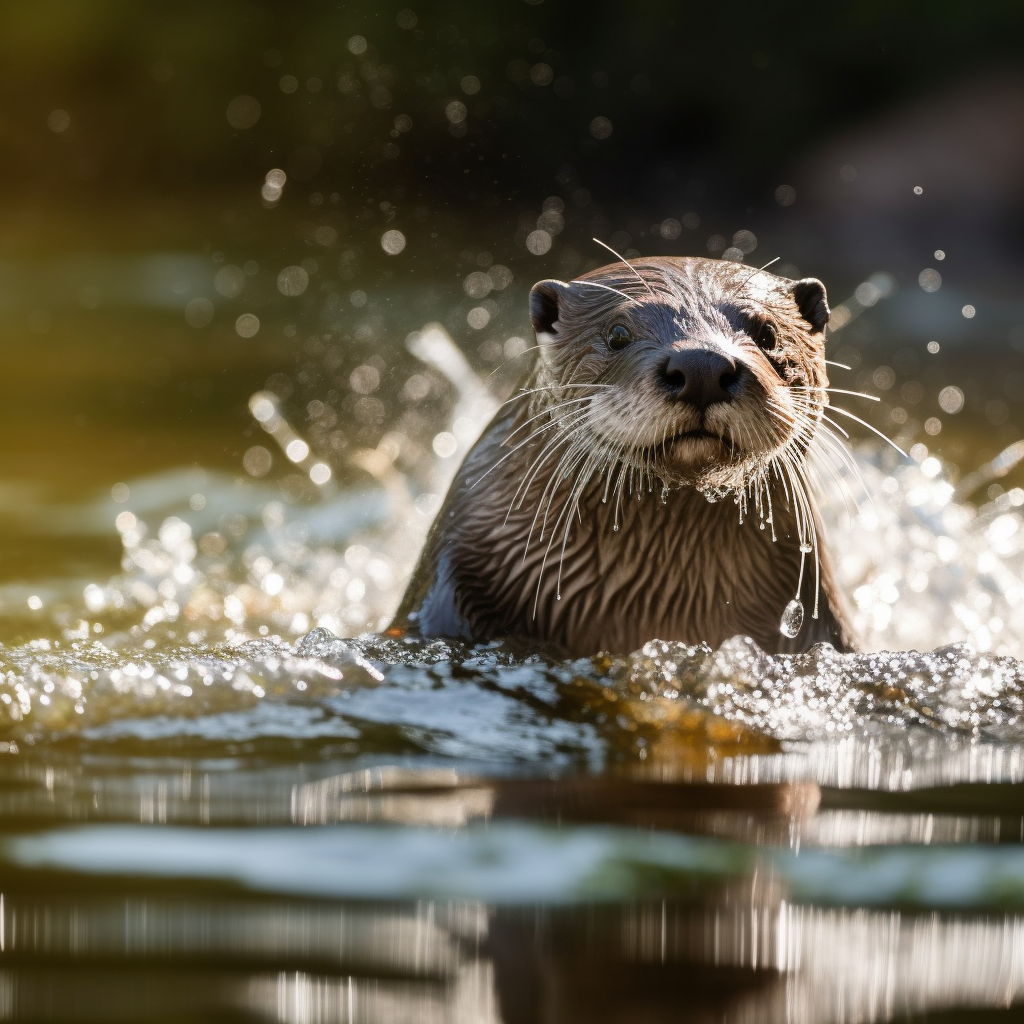
A. The Natural Habitat of River Otters in Rhode Island
Rhode Island, despite being the smallest state in the United States, is home to a diverse range of wildlife. One fascinating creature that can be found in the state’s rivers and wetlands is the North American River Otter. These playful and charismatic aquatic mammals have adapted to thrive in Rhode Island’s unique ecosystem.
River otters are well-suited to their watery habitat, with streamlined bodies, webbed feet, and a thick, waterproof coat of fur. They are excellent swimmers, capable of diving up to 60 feet and staying submerged for several minutes. Their long, muscular tails act as rudders, helping them navigate through the water with ease.
In Rhode Island, river otters can be found in various habitats, including freshwater rivers, lakes, ponds, and coastal areas. They are particularly fond of areas with dense vegetation along the water’s edge, as this provides them with cover and easy access to their main food sources.
B. The Role of River Otters in Rhode Island’s Ecosystem
River otters play a vital role in maintaining the balance of Rhode Island’s ecosystem. As top predators, they help control the populations of their prey, such as fish, amphibians, and crustaceans. By regulating these populations, otters indirectly influence the entire food web, ensuring the health and stability of the ecosystem.
Furthermore, otters are known to create “slides” along the riverbanks, which are distinctive pathways they use to enter and exit the water. These slides not only serve as a means of transportation for the otters but also benefit other species. The slides can become important access points for smaller animals, such as turtles and muskrats, allowing them to move between land and water more easily.
River otters are also indicators of a healthy environment. Their presence in Rhode Island’s rivers and wetlands is a sign of clean water and abundant food sources. Protecting and conserving their habitat not only benefits the otters themselves but also ensures the overall well-being of the ecosystem.
In recent years, there have been efforts to monitor and track the otter population in Rhode Island. These initiatives help researchers better understand otter behavior, habitat preferences, and population trends. By studying the otters, scientists can gather valuable data that informs conservation strategies and ensures the long-term survival of this remarkable species.
In conclusion, the river otter is a native resident of Rhode Island, thriving in its diverse aquatic habitats. These playful and important creatures contribute to the balance and health of the state’s ecosystem. By protecting their habitat and monitoring their population, we can ensure the continued presence of these fascinating animals in Rhode Island’s natural landscape.
The Legal Aspect: Owning an Otter in Rhode Island
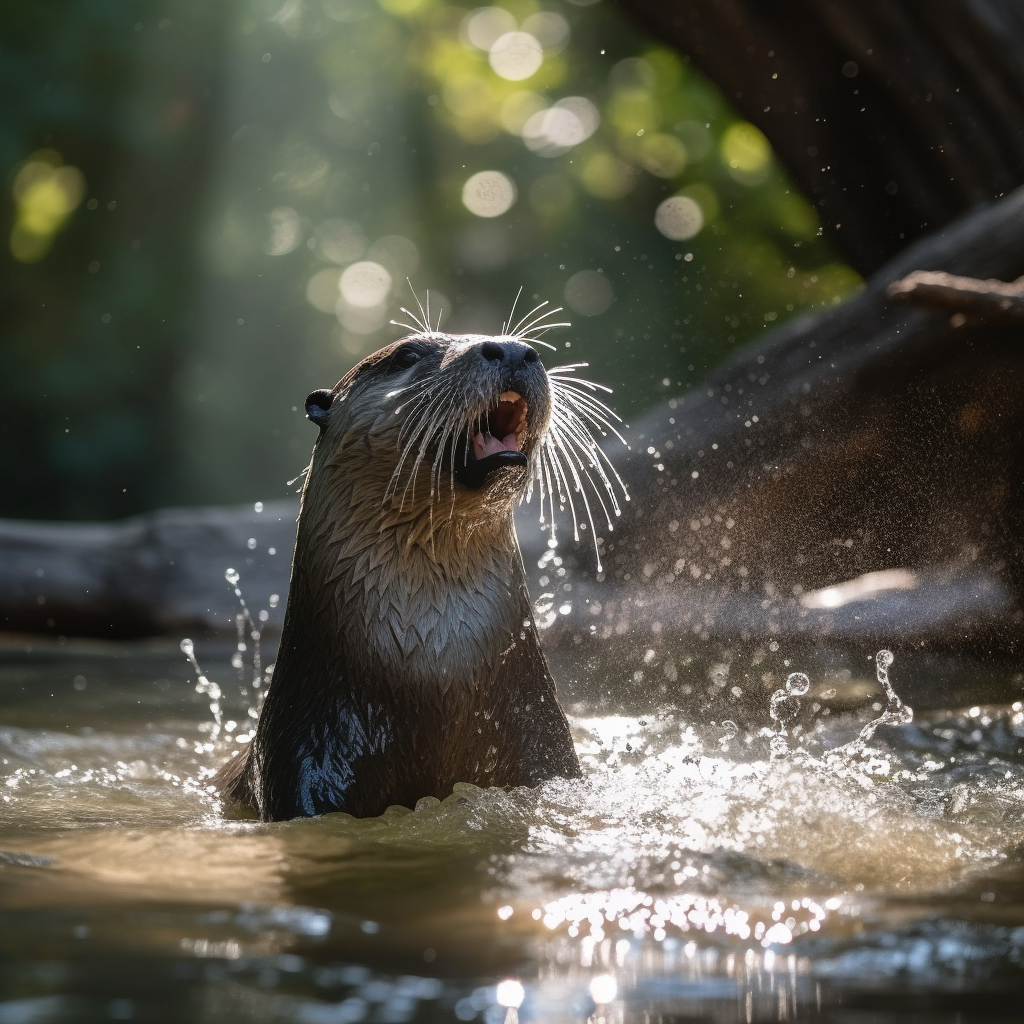
A. The Legalities of Owning an Otter in Rhode Island
When it comes to owning an otter as a pet in Rhode Island, there are certain legalities that need to be considered. While these playful creatures may seem like an appealing choice for some, it’s important to understand the regulations surrounding their ownership.
In Rhode Island, the North American River Otter is a protected species under state law. This means that it is illegal to capture, possess, or sell otters without the appropriate permits and licenses. The state has implemented these regulations to ensure the conservation and protection of otters and their natural habitats.
To legally own an otter in Rhode Island, individuals must obtain a special permit from the Rhode Island Department of Environmental Management (RIDEM). This permit is required for both capturing and possessing otters. It is essential to note that permits are only granted for specific purposes, such as educational or scientific research.
The process of obtaining a permit involves submitting an application to the RIDEM, which includes detailed information about the intended purpose of owning an otter. The department carefully reviews each application to ensure that the individual has the necessary knowledge and resources to provide proper care for the otter.
B. The Impact of Pet Ownership on River Otters
While the idea of having an otter as a pet may be appealing, it’s crucial to consider the impact of pet ownership on these fascinating creatures. River otters are highly adapted to their natural habitats and have specific needs that may be challenging to meet in a domestic setting.
Otters are aquatic mammals, and their natural habitat consists of rivers, lakes, and wetlands. They are skilled swimmers and spend a significant amount of time in the water. Owning an otter as a pet would require providing a suitable environment that mimics their natural habitat, including access to clean water and ample space for swimming and playing.
Furthermore, otters have specific dietary requirements. They primarily feed on fish, crustaceans, and amphibians. Providing a balanced and appropriate diet for an otter can be complex and may require specialized knowledge and resources.
It’s also important to consider the social and behavioral needs of otters. They are highly social animals and thrive in the company of their own kind. Isolating an otter from its natural social structure can lead to stress and behavioral issues.
In conclusion, while owning an otter may seem appealing, it is essential to understand the legalities and responsibilities associated with it. River otters are protected species in Rhode Island, and owning one requires a special permit. Additionally, the impact of pet ownership on otters should be carefully considered, including their specific habitat, dietary, and social needs. It is crucial to prioritize the conservation and protection of otters and their natural habitats, ensuring their well-being for future generations.
The Current Status of Otters in Rhode Island
A. The Population of Otters in Rhode Island
Rhode Island, known for its diverse wildlife and stunning natural landscapes, is home to a thriving population of North American River Otters. These charismatic aquatic mammals have made a remarkable comeback in the state after facing significant declines in the past.
River Otters, scientifically known as Lontra canadensis, are well-adapted to their semi-aquatic lifestyle. They have long, streamlined bodies, webbed feet, and a thick, waterproof coat that helps them navigate through water with ease. These playful creatures are highly skilled swimmers and are often spotted in rivers, lakes, and coastal areas throughout Rhode Island.
Over the years, the efforts of wildlife conservation organizations and state agencies have played a crucial role in the recovery of the River Otter population in Rhode Island. Through habitat restoration, strict regulations, and public awareness campaigns, these organizations have successfully created a favorable environment for otters to thrive.
B. Conservation Efforts for River Otters in Rhode Island
Conserving the River Otter population in Rhode Island is of utmost importance to maintain the state’s biodiversity and preserve its natural resources. Several initiatives have been undertaken to protect and support these fascinating creatures.
-
Habitat Restoration: One of the key conservation efforts is focused on restoring and preserving the river ecosystems that serve as the otters’ natural habitat. By protecting and enhancing the quality of rivers, lakes, and wetlands, conservationists ensure an abundant food supply and suitable living conditions for otters.
-
Regulations and Protection: The Rhode Island Department of Environmental Management (DEM) has implemented strict regulations to safeguard otters and their habitats. These regulations include restrictions on trapping and hunting, as well as guidelines for maintaining a safe distance from otters in the wild. By enforcing these regulations, the DEM ensures the long-term survival of otter populations.
-
Public Awareness and Education: Raising awareness among the general public about the importance of otter conservation is crucial. Educational programs, workshops, and outreach activities are organized to inform people about otter behavior, their role in the ecosystem, and the need to protect their habitats. By fostering a sense of responsibility and appreciation for otters, these initiatives encourage individuals to actively participate in conservation efforts.
-
Collaboration and Research: Collaboration between wildlife conservation organizations, researchers, and government agencies is vital for effective otter conservation. Through ongoing research and monitoring programs, experts gather valuable data on otter populations, behavior, and habitat requirements. This information helps inform conservation strategies and ensures that efforts are targeted and effective.
-
Protection of Natural Areas: Preserving and expanding protected areas, such as state parks and wildlife refuges, is essential for otter conservation. These protected areas provide safe havens for otters and other wildlife, allowing them to thrive without disturbance. By supporting the establishment and maintenance of these protected areas, conservationists safeguard otter populations and their habitats.
In conclusion, the current status of otters in Rhode Island is a testament to the success of conservation efforts and the dedication of various organizations and agencies. By restoring habitats, implementing regulations, raising public awareness, and conducting research, Rhode Island is ensuring the long-term survival of these fascinating creatures. The thriving otter population not only adds to the state’s biodiversity but also serves as a reminder of the importance of environmental conservation.
Conclusion
In conclusion, the presence of river otters in Rhode Island is an exciting and positive development for the state’s ecosystem. These playful and intelligent creatures have made a remarkable comeback after being nearly extinct in the region. Thanks to conservation efforts and improved water quality, river otters are now thriving in Rhode Island’s rivers, lakes, and wetlands. Their presence not only adds to the biodiversity of the area but also serves as an indicator of a healthy and balanced ecosystem. As we continue to protect and preserve their habitats, we can look forward to seeing more of these fascinating creatures in the years to come. So, if you ever find yourself near a river or lake in Rhode Island, keep an eye out for the delightful sight of a river otter swimming and playing in its natural habitat. It’s a truly special experience that reminds us of the beauty and resilience of nature.
Frequently Asked Questions
How many rivers are in Rhode Island?
Rhode Island, despite being the smallest state in the U.S., is home to over 100 rivers. These rivers contribute significantly to the state’s biodiversity and serve as habitats for a variety of aquatic mammals.
What is the status of the River Otter population in Rhode Island?
The North American River Otter population in Rhode Island is stable and healthy, thanks to the state’s conservation efforts. However, exact numbers can vary as otters are elusive creatures and tracking them can be challenging.
Can you own an otter in Rhode Island?
No, it is illegal to own a North American River Otter as a pet in Rhode Island. These otters are protected species and are best left in their natural habitats.
Are there otters in Rhode Island?
Yes, Rhode Island is home to the North American River Otter. They can be found in various aquatic habitats across the state, including rivers, lakes, and marshes.
What is being done for Otter conservation in Rhode Island?
Rhode Island’s environmental conservation efforts include protecting and preserving otter habitats, monitoring otter populations, and implementing laws against hunting or owning otters. The state also works closely with various organizations to promote otter conservation.
What is the typical behavior of a River Otter?
River Otters are highly social and playful animals. They are known for their playful sliding behavior, which is not just for fun but also a practical way of getting around. They are nocturnal and have a diet mainly consisting of fish, amphibians, and crustaceans.
What are some common Otter sightings in Rhode Island?
Otters can often be spotted in Rhode Island’s parks and nature reserves, particularly near bodies of water. Sightings are more common during dawn and dusk when otters are most active.
What adaptations do River Otters have?
River Otters are well-adapted to aquatic life. They have webbed feet for efficient swimming, dense fur for insulation, and a long, tapered tail for navigation in water. Their nostrils and ears close when they dive underwater.
How does the River Otter contribute to Rhode Island’s biodiversity?
River Otters play a crucial role in maintaining the health of Rhode Island’s river ecosystems. They help control the population of certain species, thus contributing to the balance of the ecosystem. Their presence often indicates a healthy aquatic environment.
What is the diet of a River Otter in Rhode Island?
The diet of a River Otter in Rhode Island primarily consists of fish. However, they are opportunistic feeders and also consume various amphibians, crustaceans, and occasionally small mammals and birds. Their diet varies depending on the season and availability of food sources.



